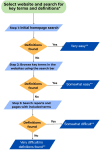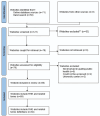Terminology and Definitions of Racial Health Equity in Prominent Health Websites: Systematic Review
- PMID: 40745911
- PMCID: PMC12332040
- DOI: 10.2196/64868
Terminology and Definitions of Racial Health Equity in Prominent Health Websites: Systematic Review
Abstract
Background: The websites of prominent public health and health care organizations play pivotal roles in ensuring access to quality health information, including information guiding health equity. Several initiatives have been developed in the United States to promote equitable, fair, and inclusive health information and practices across prominent health websites. Currently, health disparities across racial groups are recognized as a critical public health problem. Simultaneously, the use of the term "racial health equity/equities" has been rising in academic literature. However, the definition and findability of "racial health equity/equities" information have not yet been evaluated in health websites. Thus, we used a systematic review approach to assess the findability and availability of racial health equity terminology and definitions across prominent health organization websites.
Objective: The objective of this study was to systematically evaluate the definitions and findability of "racial health equity/equities and related terms" on prominent health organizations' websites.
Methods: We conducted a systematic review of websites from government agencies, professional organizations, and selected health care organizations with relevance to the US health care system. Google and the US Digital Analytics program were used for initial searches. Definitions, terms, and accompanying citations for racial health equity terms, including "racial health inequity" or "racial health disparities," were extracted from all websites. A findability tool was developed to evaluate the ease of finding the terms and definitions, with ratings ranging from "very easy" to "very difficult." Additionally, we analyzed the themes and sentiments of the retrieved definitions.
Results: We analyzed 69 websites from prominent health organizations. Approximately half (n=31) of the websites lacked any definitions for racial health equity and related terms, and of the 38 that included definitions, most did not include citations. The definitions varied across websites, and most were rated as "very difficult" to find.
Conclusions: This study highlights the absence of a systematic, standardized, and accurate approach to organizing, defining, and presenting racial health equity information on prominent health websites. Specifically, there is a lack of consistent definitions for racial health equity and related terms across prominent health organization websites.
Keywords: United States; definitions; health care; health equity; health information; inclusive; promotion; public health; race; racial; racial health equity; sentiment analysis; systematic Review; thematic analysis; web-based health information; websites.
© Mahederemariam Bayleyegn Dagne, Elizabeth Terhune, Miriam Barsoum, Ana Beatriz Pizarro, Anita Rizvi, Damian K Francis, Meera Viswanathan, Nila Sathe, Vivian Welch, Tiffany Duque, Robert W Turner II, Tamara A Baker, Patricia C Heyn. Originally published in the Journal of Medical Internet Research (https://www.jmir.org).
Conflict of interest statement
Figures





Similar articles
-
Cost-effectiveness of using prognostic information to select women with breast cancer for adjuvant systemic therapy.Health Technol Assess. 2006 Sep;10(34):iii-iv, ix-xi, 1-204. doi: 10.3310/hta10340. Health Technol Assess. 2006. PMID: 16959170
-
Systemic pharmacological treatments for chronic plaque psoriasis: a network meta-analysis.Cochrane Database Syst Rev. 2020 Jan 9;1(1):CD011535. doi: 10.1002/14651858.CD011535.pub3. Cochrane Database Syst Rev. 2020. Update in: Cochrane Database Syst Rev. 2021 Apr 19;4:CD011535. doi: 10.1002/14651858.CD011535.pub4. PMID: 31917873 Free PMC article. Updated.
-
Systemic pharmacological treatments for chronic plaque psoriasis: a network meta-analysis.Cochrane Database Syst Rev. 2021 Apr 19;4(4):CD011535. doi: 10.1002/14651858.CD011535.pub4. Cochrane Database Syst Rev. 2021. Update in: Cochrane Database Syst Rev. 2022 May 23;5:CD011535. doi: 10.1002/14651858.CD011535.pub5. PMID: 33871055 Free PMC article. Updated.
-
Systemic corticosteroids for the treatment of COVID-19: Equity-related analyses and update on evidence.Cochrane Database Syst Rev. 2022 Nov 17;11(11):CD014963. doi: 10.1002/14651858.CD014963.pub2. Cochrane Database Syst Rev. 2022. PMID: 36385229 Free PMC article.
-
Unconditional cash transfers for reducing poverty and vulnerabilities: effect on use of health services and health outcomes in low- and middle-income countries.Cochrane Database Syst Rev. 2017 Nov 15;11(11):CD011135. doi: 10.1002/14651858.CD011135.pub2. Cochrane Database Syst Rev. 2017. Update in: Cochrane Database Syst Rev. 2022 Mar 29;3:CD011135. doi: 10.1002/14651858.CD011135.pub3. PMID: 29139110 Free PMC article. Updated.
References
-
- Barton B, Boonyasai RT, Hahn C, et al. National healthcare quality and disparities report. [10-04-2024];2023 https://www.ahrq.gov/sites/default/files/wysiwyg/research/findings/nhqrd... URL. Accessed.
-
- Kutner M, Greenberg E, Jin Y, Paulsen C. The health literacy of America’s adults: results from the 2003 National Assessment of Adult Literacy. 2006. [10-04-2024]. https://nces.ed.gov/pubsearch/pubsinfo.asp?pubid=2006483 URL. Accessed.
Publication types
MeSH terms
LinkOut - more resources
Full Text Sources

